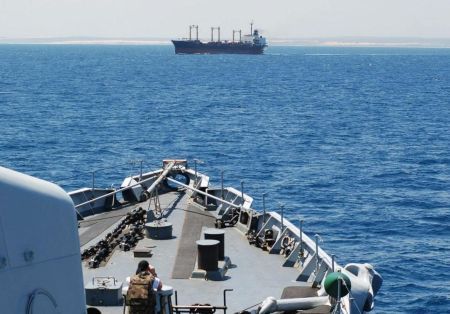
IMO has pledged its support to assist in the implementation of a new Code of Conduct concerning the prevention and repression of piracy, armed robbery against ships and illicit maritime activity in west and central Africa, which has been adopted at a Ministerial meeting in Cotonou, Benin.
The Code is expected to be opened for signature at the meeting of the Heads of State and Government of Central and West African States, expected to be held in Yaoundé, Cameroon, in May 2013.
Welcoming the adoption of the Code, IMO Secretary-General Koji Sekimizu said that IMO was ready to support the countries in the region in its implementation.
“IMO has been working for a number of years with international development partners on a number of activities aimed at enhancing the ability of individual States in the region, and the wider sub-region, to build a sustainable maritime capacity and we look forward to continuing to work with them to support the implementation of this Code and to work together to repress piracy, armed robbery against ships and other illicit maritime activity off the coasts of west and central Africa,” Mr. Sekimizu said. “We look forward to continuing to work with the countries to assist in the implementation of this new Code.”
The Code was developed by the Economic Community of West African States (ECOWAS) and the Economic Community of Central African States (ECCAS), pursuant to United Nations Security Council resolutions 2018(2011) and 2039(2012), which expressed concern about the threat that piracy and armed robbery at sea in the Gulf of Guinea pose to international navigation, security and the economic development of states in the region. These resolutions encouraged the States of ECOWAS, ECCAS and the Gulf of Guinea Commission (GGC) to develop a comprehensive regional strategy and framework to counter piracy and armed robbery, including information sharing and operational coordination mechanisms in the region, and to build on existing initiatives, such as those under the auspices of IMO.
IMO has assisted ECOWAS in the drafting of the Code, which incorporates many elements of the IMO-developed Djibouti Code of Conduct, signed by 20 States in the western Indian Ocean and Gulf of Aden area, as well as provisions from the existing Memorandum of Understanding (MoU) to establish a sub-regional integrated coast guard function network in West and Central Africa, developed in 2008 by IMO and the Maritime Organization of West and Central Africa (MOWCA). The MoU has been signed by 15 of the 20 coastal States in the region.
Signatories to the Code intend to co-operate to the fullest possible extent in the prevention and repression of piracy and armed robbery against ships, transnational organized crime in the maritime domain, maritime terrorism, illegal, unreported and unregulated (IUU) fishing and other illegal activities at sea with a view towards:
(a) sharing and reporting relevant information;
(b) interdicting ships and/or aircraft suspected of engaging in such illegal activities at sea;
(c) ensuring that persons committing or attempting to commit illegal activities at sea are apprehended and prosecuted; and
(d) facilitating proper care, treatment, and repatriation for seafarers, fishermen, other shipboard personnel and passengers subject to illegal activities at sea, particularly those who have been subjected to violence.
Whilst promoting regional co-operation, the Code recognizes the principles of sovereign equality and territorial integrity of States and that of non-intervention in the domestic affairs of other States.
IMO has been involved in technical assistance projects relating to the maritime field in the region for many years and established a regional presence in west Africa in 1999. IMO currently has two regional coordinators based in Côte d’Ivoire for west and central Africa (Francophone) and Ghana for west and central Africa (Anglophone).
More recently, IMO has been conducting a series of “table top exercises” aimed at developing and promoting a multi-agency, whole of government approach to maritime security and maritime law enforcement issues in States throughout the region. The initial pilot exercise was held in Ghana in August 2012 with similar exercises being conducted in Equatorial Guinea, the Gambia, Liberia and Sierra Leone. Further exercises are currently scheduled for Côte d’Ivoire, the Congo, the Democratic Republic of the Congo and Senegal, with more to come.
IMO is also supporting the Oil Companies International Marine Forum (OCIMF) and the Government of Ghana to develop the Maritime Trade Information Sharing Centre (MTISC) in Ghana. Following its successful operational trial during a recent naval exercise, it is intended that the MTISC will become operational as soon as possible. It is intended that the MTISC will receive and promulgate information from and to merchant shipping operating in the area in order to assist them to develop situational awareness.
Funding for this work has come from IMO’s global maritime security capacity-building programme, with particular support from the Governments of Norway and the United States of America.
In relation to piracy off the coast of Somalia and in the wider Indian Ocean, 20 States have signed the Code of Conduct concerning the Repression of Piracy and Armed Robbery against Ships in the Western Indian Ocean and the Gulf of Aden (Djibouti Code of Conduct), which was adopted in 2009. IMO is also involved in the implementation of that Code, with funding from the IMO Djibouti Code Trust Fund, which has received donations from Denmark, France, Japan, the Marshall Islands, the Netherlands, Norway, the Republic of Korea and Saudi Arabia.
We use cookies to improve your experience. By continuing to use our site, you accept our Cookies, Privacy Policy,Terms and Conditions. Close X